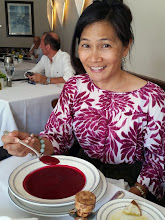
The "inbox" is the lunch box, marked, "Urgent."
Last year, I waxed rhapsodic over its verdant green majesty and its garlicky-lemony fragrance that brings to mind the picnics and sunshine of days past and of days to come.
This year, however, my enjoyment of this seasonal delight reminds me of "Springtime à la Carte," one of my favorite stories by William Sydney Porter, who is more commonly known as O. Henry.
In the story, which is set in the early 1900s in New York, a young girl named Sarah earns her meals from a neighborhood restaurant by typing up the menu. One day, as the city begins to show burgeoning signs of spring, as depicted through the images of apparel buyers ordering Easter finery and the premature shutting-off of steam heat in buildings, she works away tearfully while missing her beau, a farmer whom she had fallen in love with the previous summer. The menu that she labors over that particular day also reflects the restaurant's doffing of its winter coat with offerings more suitable for warmer days:
"To-day there were more changes on the bill of fare than usual. The soups were lighter; pork was eliminated from the entrees, figuring only with Russian turnips among the roasts. The gracious spirit of spring pervaded the entire menu. Lamb, that lately capered on the greening hillsides, was becoming exploited with the sauce that commemorated its gambols...The pie list swelled; the richer puddings had vanished; the sausage, with his drapery wrapped about him, barely lingered in a pleasant thanatopsis with the buckwheats and the sweet but doomed maple."

I love it when I still have to look up a word when I read.
When people ask me how I became a writer, the simplest part of my convoluted answer is that I read, read, and read. To shape a dream, you have to watch others achieve it, which is why Food Network is so popular. We not only admire the culinary skills of the chefs and foodies on the programs, but we picture ourselves in the kitchen performing as they do.

Ina Garten, the "Barefoot Contessa," exhorts us to find out, "How easy is that?"... And she's usually right.
Porter's writing does not only open a window to an gone-by era of the pier-glass ("Gift of the Magi," my gold standard for the perfect Christmas story) and conniving cowboys ("The Pimienta Pancakes" - Porter wrote great food stories). You can savor his stories like an hors d' oeuvre: they're brief, they end with a satisfying twist, and they leave you wanting more.

William Sydney Porter, known as O. Henry. I don't think the candy bar was named after him.
By today's sophisticated standards, these twists are pretty obvious, but they speak to a thematic connectivity that is the hallmark of good writing that don't always reach but I do try. And trying is at the core of Porter's tales of Everyman and Everywoman, who give their all to the basic human quests for success, comfort, and love. Behind the action, his joie de vivre stands out through his abilities. He is one of those rare writers who like accomplished chefs, bring the very best out of their main ingredient, the written word.
Spring is the season of new beginnings and hoping for the best - and for moments like eating grilled asparagus at your desk and realizing that sometimes, it just doesn't get better than this. Sarah would have loved the asparagus. And if her bucolic suitor showed up as he did in "Springtime" (Porter almost always serves up a happy ending) while she was eating it at her desk, I imagine she would have made him order his own - it's almost too good to share.





